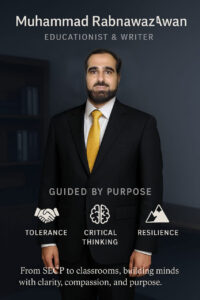The recent grade nine results in Punjab are not just numbers on a sheet; they are a wake-up call for all of us. They reflect systemic flaws that cannot be ignored. While much has been said about the root causes of these deplorable outcomes, one truth stands out: the absence of timeless Prophetic values in our classrooms has contributed to this downfall.
This blessed month of Rabi-ul-Awal, as we celebrate the 1500th birth anniversary of our Beloved Prophet (PBUH), offers us the perfect occasion to reflect on his guidance. His teachings are not confined to rituals; they are living principles that, if adopted, can reshape our classrooms and transform our education system. The lack of resilience, humility, compassion, and patience in our teaching practices has left learning shallow and fragile. Bringing these values back is the recipe for true success.
From the campaign I have run during this sacred month, I wish to highlight a few guiding lights:
- Resilience: Without resilience, failure breaks students instead of strengthening them. The Prophet (PBUH) taught us never to let hardship break our spirit.
- Seek knowledge with humility: Arrogance breeds complacency. True learning begins with humility, which opens the doors of wisdom.
- Listening before speaking: Our classrooms often reward noise over reflection. Real understanding begins in attentive silence.
- Gratitude: Knowledge without gratitude is hollow; gratitude turns knowledge into light.
- Respecting differences: Intolerance silences creativity. The Prophet (PBUH) valued diversity of thought and culture; so must our schools.
- Correcting with compassion: Harsh punishment breeds resentment. Corrections rooted in compassion nurture growth.
- Kindness: Harshness erodes confidence, but kindness awakens potential. True education is rooted in kindness.
- Leading by example: Empty instructions fail where living examples inspire. Teachers must embody the values they impart.
- Respecting diverse voices: Ignoring voices stifles confidence; respecting them cultivates excellence.
- Forgiveness: When mistakes become final judgments, learning ends. Forgiveness gives students second chances to grow.
- Patience: Rushing results creates shallow learning; patience produces mastery.
- Humility in learning: Complacency halts progress, but humility keeps the heart open to wisdom.
Our failure to embed these values explains much of the decline we lament today. Incorporating them, on the other hand, offers a clear path forward. These principles, deeply embedded in the life and teachings of Prophet Muhammad (PBUH), are not only a moral compass but also a practical framework for reform. If embraced, our education system will not merely produce exam-passers, but citizens of resilience, compassion, and wisdom.
As we celebrate this blessed month, let us resolve to make education in Punjab and across Pakistan more than a process of rote memorization and examination. Let us make it a journey of character-building, guided by the eternal light of Prophetic wisdom—a recipe for both individual and collective success.
—
The writer, Muhammad Rabnawaz Awan, is a corporate communications and public relations specialist turned educationist and columnist. Having stepped into the classroom from the boardroom on the call of his conscience, he now writes on social reform, education, and the message of tolerance.







Comments are closed, but trackbacks and pingbacks are open.